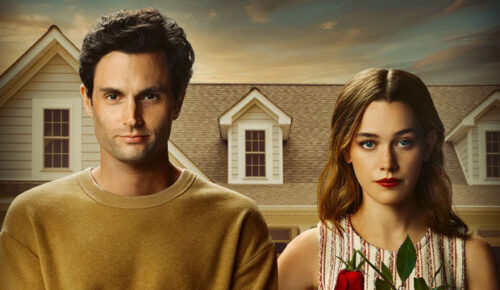Warning – Spoilers ahead !
Previous seasons of You have presented all the makings of a modern romantic story: Boy meets girl, boy falls in love with girl, boy would do anything for girl. This time around, however, boy happens to be an obsessive stalker whose love language includes nothing short of murder—that is, until he meets his perfect match, creating a recipe for a perfectly unhinged love story. This sequence is continued in the third season of You, a Netflix original that embraces the villain as the protagonist, ultimately keeping the audience unsure if they should support the brooding-yet-charming Joe Goldberg (Penn Badgley) despite his sociopathic tendencies.
Following the twist ending of the second season, this latest instalment strays from the similar structures established in the first two seasons of the show. With the murderous and psychotic tendencies of the main characters exposed, the episodes follow newlyweds Joe and Love Quinn-Goldberg (Victoria Pedretti) attempting to settle into domestic bliss in the suburbs of Madre Linda.
Joe and Love navigate the difficulties of marriage and life with their newborn child, Henry, all while trying to integrate into a privileged upper-middle class milieu, suppressing their aversion to their neighbour’s “woke,” status-driven lifestyles.
Though the dark secrets harboured by the new residents risk alienating the couple from their community, the show’s narrative never fails to recognize their privilege as a white, cis-gendered heterosexual couple, whose cushy lifestyle is funded by Love’s family fortune. Neither Joe nor Love would have been able to maintain the illusion of the American dream had it not been for the safety net of wealth and influence provided by Love’s family, which allowed the two to narrowly escape run-ins with the law. The genius of the series lies within the duplicity of their lives as criminals and as blissfully engaged community members. This dynamic creates a vehicle for social commentary, despite the absurdity of the contrast between serial murderers and athleisure-wearing, gossip-hungry yoga moms. Even in such a bizarre setting, the show still uses its protagonists to critique different aspects of society.
Viewers know that Love killing her neighbour in a burst of rage is wrong, but they can’t help but agree with her disgust toward the hypocrisy of the neighbourhood women, who profit off of her victim’s disappearance to gain sympathy from their masses of online followers. In one of her many impulsive homicidal outbursts, Love assaults a fellow Madre Linda resident and locks him in a cage in the basement of her bakery upon hearing about how his anti-vax opinions led to her son’s hospitalization. His child, who hadn’t received the measles vaccine, was around Joe and Love’s son and passed the disease onto him. Despite the condemnable act of violence perpetrated against a fellow parent, the transmission of political messages—in this case, on the importance of vaccines—succeeds by vilifying a character described as the person for whom “World’s Greatest Dad” mugs were created.
Ultimately, the contrast of the plastic purity of Madre Linda and the gruesome hobbies of their newest residents provides a channel for social commentary of the real world that ultimately ushers in a reckoning of our own morality—by succeeding in making us root for the villain.








